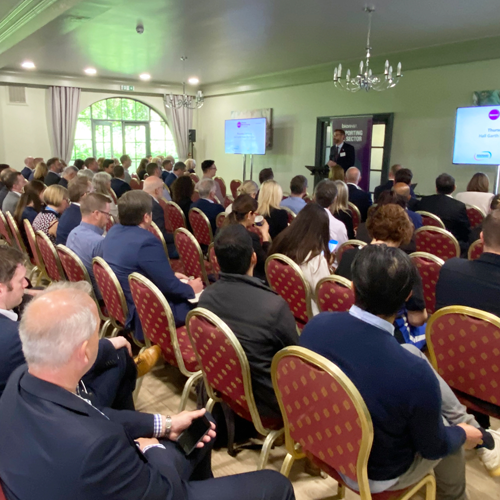Pharma Manufacturing 2023: Celebrating the Northern Powerhouse

This year’s sold out Pharma Manufacturing conference welcomed 130 delegates, exhibitors and speakers to come together and share ideas, collaborate and inform on this exciting and expanding sector to identify challenges and opportunities in the industry.
As the world re-emerges from a global pandemic and the UK continues to navigate Brexit, the sector continues to face challenges. Discussions centred around the key topics of sustainability and working towards a more sustainable future, advanced manufacturing technologies, the changing workforce of the 21st century and pioneering cell and gene therapies.
The conference benefitted from the insights of three keynote speakers regarding sustainability: Paul Cook, Associate Director of Facilities at Bristol-Myers Squibb, FUJIFILM Diosynth Biotechnologies CEO Martin Meeson and Dr Trish Melton, Founder and Managing Director of MIME Solutions.
The focus of the first keynote speech was on facility design with sustainability at its heart, and how this can contribute to better innovation throughout the supply chain. Various examples of successful building sustainability at Bristol-Myers Squibb were identified, including adopting the ‘simple design’ philosophy to increase energy efficiency, reducing carbon footprint and reusing existing infrastructure and striving to design new facilities using the gold standard for best practice in sustainable building design, construction and operation. Aside from the environmental benefits, it was also noted that sustainable building practices encouraged local statutory bodies to be more engaged and willing to provide support and assistance, and allowed the organisation to become ‘an influencer’ as this helps engage other employers in the area to follow a similar path.
The second keynote gave an overview of the continued growth and development of Fujifilm Diosynth Biotechnologies (FDB) and how it has grown and developed in recent years. Since April 2018 the company has invested $7.5 Billion in the organisation. This highlighted that it is ‘not just the buildings but what we are going to do with the buildings’ that is exciting, and how the company can accelerate the development and manufacture of new forms of medicine. With sustainability in mind, FDB are making sure these assets can be flexible and pivot to different needs and changes in circumstances and that the design of new facilities focuses on everything from reclaimed methane to locking in a partnership with suppliers.
The final keynote of the day continued the theme that ran throughout by looking at best practice in working towards a sustainable future. Key takeaways included the importance of embedding sustainability in organisational culture through values, behaviours and actions, and building a framework for change from the top down using engagement, setting a baseline and informing continuous improvement. The need to address tensions by balancing ethics and morals with the impact on profit, regulatory issues and the wider supply chain was also discussed.
The presentation concluded by summarising four key areas to consider when embedding sustainability: aligned vision and strategy, engaging employees to collaborate and advocate, pushing real change within organisations and more widely, and implementing measures to drive success.
Bionow’s Executive Director of Business Development, Stella James, commented: “The North of England represents one of the UK’s top pharma manufacturing locations and it’s fantastic to see industry, academic and regulatory experts get together to identify challenges and opportunities within this lucrative sector. It was also great to see real world examples of how sustainable practices can be implemented successfully.”
Pharma Manufacturing 2023 is supported by Bouygues Energies & Services, Tees Valley Combined Authority, AstraZeneca, Bristol-Myers Squibb, Pharmaron and CSL Seqirus.





















